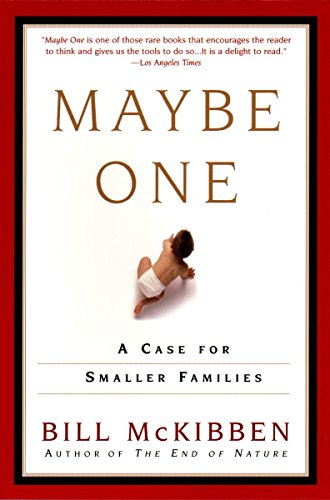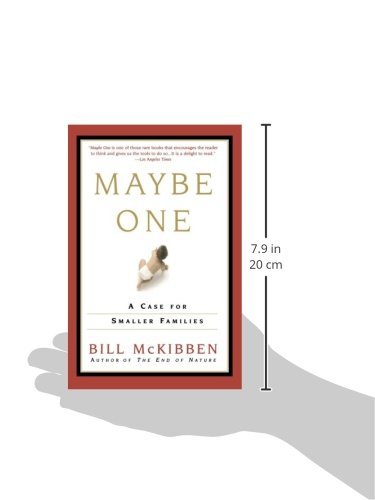Customer Services
Copyright © 2025 Desertcart Holdings Limited
Desert Online General Trading LLC
Dubai, United Arab Emirates



Full description not available
U**8
A decent read, but not for everyone having this internal struggle.
As an individual debating having children, I decided to pick up this book.It was recommended by a family member who is having this exact debate...has one child, do they decide to bring in more?Not sure if this helped with my decision; this provides psychological reasons to/not to - not environmental or emotional, etc.Especially as his own research did not end up really aiding his own decision. I learned it's all personal, and not any other factors can really influence.
K**S
Gives Me Lots of Food for Thought
Certainly, I am not making my reproductive choices based off of one book, but it has helped lifted fear from me of wanting just to have one child (a decision we are making for our family--not so much the rest of the world). I really appreciate how McKibben has delved into the history behind the "only children are spoiled weirdos" bias, and it's been uplifting to read the evidence of how that is certainly not true. While the book is certainly not the be all or end all to deciding whether or not to have more kids, it is a very interesting read.
L**L
Ok
I bought this book because I had doubts about just having one child. It talks about the environments and how lowering the population will help the planet. It also talks about studies and misconceptions about only children compared to children with siblings and the results are positive. I don't think this cemented my decision on having one child but it was an interesting book. I recommend this book to people who also can’t have children or can only have one. It doesn’t discuss anything about not having children but the reasons behind only having one can apply to not having children as well when it comes to how much we consume from our environment and how we are polluting with our growing population. I would say those could also be used as reasons to not have children or help ask you feel more comfortable about it.
C**N
Not a book for parents truly considering a one child family!
While this book may contain a wealth of information about climate change, population explosion, and other environmental calamaties that will take hold in the near future - it is important to know what this book is not... and that is a book about the choice to bring another child into this world. As a well-informed parent, I scowered the bookshelves of Amazon.com looking for various literature on the benefits and drawbacks of having an only child. From the title, and indeed, the first chapter of the book, I thought I had found such a work. However, the first chapter is the only chapter that truly addresses "one child families" and that chapter is only tangentially related to the rest of the book. I was deeply dissappointed in this purchase, not because I agree or disagree with what is stated within most of its pages, but rather because Mr. McKibben seems to have found a creative way to find a captive audience to his preachings on an unrelated subject matter. A book with a child on the front cover, titled "Maybe One" and sub-titled "A Case for Smaller Families" should contain some information pertaining to families. This is not the case. If I want to buy a book on environmental warming or climate change or the population problem... then I know where to find that section of the library or book store. Mr. McKibben's veiled attempt to increase his audience size through mischaracterizations is disappointing and insulting.
M**B
Should be a classic, surprised it's not
It's been awhile since I read this but I picked up my copy the other day and it's full of underlining and the very fact that I once PURCHASED it (NEW!) is a testament to my liking for it since I am usually one to get my books at the library. I also recall it being very thoughtfully written and thought-provoking. I'm surprised it has so few reviews, TBH.
M**S
Maybe someday...
The subject of McKibben's book--overpopulation and the consideration of voluntarily limiting family size to one child--is a sensitive issue that often comes fraught with emotion. However, McKibben treats the subject with thorough, fact-based logic. He understands that it would be easy to argue that overpopulation leads to environmental issues, and from there that having more families with only one child would really help to solve this problem. But he also understands that children and the decision to have them are not always logical, that children are deeply tied into a person's emotions; so he covers many other aspects besides simply overpopulation.First of all, allow me to dispel some misconceptions. McKibben is not arguing for a "one child per family" law to be put in effect, as in China. He is only asking more people to consider having a single child in order to minimize the population problem. Secondly, he is not arguing that this needs to be permanent; he mentions at one point that the book should be written in "disappearing ink," because in 50 years it will be irrelevant, either because the population will have peaked and we'll be forced to deal with the problem or people will have decided to have less children and the population will have ebbed.Both of these points are brought up in McKibben's introduction. From there, he moves on to dispel certain stereotypes about only children. He traces the idea that there's something abnormal about only children back to its source, to illustrate the misguided prejudice that started the idea. As he mentions in this part of the book, most people have a second child because they don't want the first one to be an only child. (Note: all of McKibben's points are backed up be extensive research; each chapter has roughly 50 sources, all of which are listed at the back of the book.) As an only child, I appreciated his discourse on only children, and how they are perfectly normal; as always, it comes back to the parent(s). Multiple children can easily be more spoiled than an only child, and it's up to the parents to prevent it. (After all, a lot of the ideas about only children being spoiled seem to be based on the fact that the parents don't have to support other children, but if a family is extremely poor, an only child still wouldn't get everything s/he wants; and in wealthier families, multiple children could easily be spoiled.)McKibben also addresses the issue of whether or not overpopulation is even a problem, and other issues surrounding it, such as immigration. (As a previous reviewer pointed out, this last issue probably deserves more attention, especially now; keep in mind that his book was published 11 years ago, though.)I think one of the greatest things about this book is that McKibben practices what he preaches; he has only one child, and after her he got a vasectomy to ensure that she would stay an only child. He isn't standing on some pedestal telling everyone else that THEY need to stop having so many children. He believes in the issue enough to practice it himself. He also doesn't condemn anyone for having multiple children; ultimately, he just wants people who are considering kids or who have one already to seriously think about keeping it to one child for the sake of the earth, our only home (currently--I'm sure we'll make Mars hospitable SOMEDAY).
Trustpilot
5 days ago
1 week ago